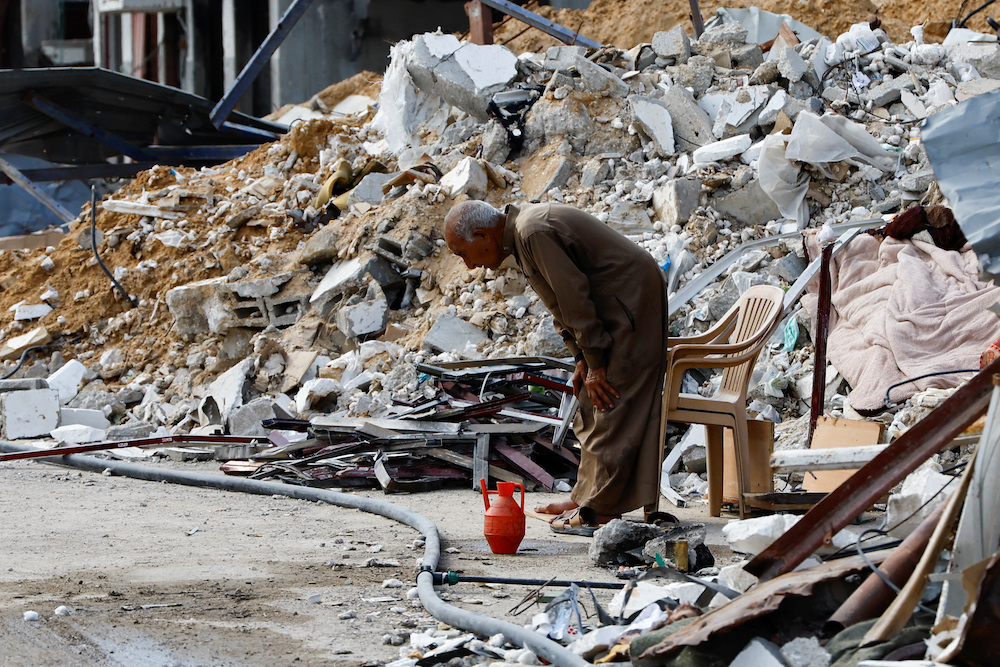BEIRUT: Lebanon is committed to UNIFIL’s mission in the south, the country’s caretaker prime minister, Najib Mikati, reiterated on Monday.
He said cooperation between the Lebanese military and UNIFIL forces is crucial, and rejected claims of differences and discrepancies, adding that “any issues arising during task implementation are promptly resolved.”
Mikati’s remarks follow a dispute between the military and a UNIFIL patrol during a joint operation within UNIFIL’s area of operation.
According to security reports, “a patrol carrying members of the French unit insisted on entering an area outside UNIFIL’s jurisdiction in the town of Kfarhamam” — a village in the border district of Hasbaya in the Nabatiye Governorate.
Residents were displaced during the escalation of hostilities between Hezbollah and the Israeli military over the past few months.
The reports said the Lebanese troops refused to follow the patrol after the French unit insisted on entering an area considered private property.
Communications intensified after the Lebanese military threatened to suspend joint patrols, with efforts focusing on mending relations.
The developments prompted Lebanese Army Command to confirm in a statement that “military units continue to carry out joint tasks with UNIFIL, maintaining close cooperation and coordination within the framework of UN Resolution 1701, in light of the exceptional circumstances and developments in the country, particularly the ongoing Israeli assaults.”
The incident in Kfarhamam occurred shortly before the extension of UNIFIL’s mandate, which is scheduled for the end of this month, and amidst increasing hostilities between Hezbollah and the Israeli military.
Mikati said on Monday that Lebanon was in discussions with the relevant countries regarding the extension of UNIFIL forces’ presence.
Last week, Foreign Minister Abdullah Bou Habib noted “slight changes to the text concerning the extension of UNIFIL forces (remaining in place).”
A security source said that Lebanon “demanded a comprehensive and ongoing coordination between UNIFIL and the Lebanese Army and that any Israeli attack on the Lebanese Army be condemned.”
Last week, the Lebanese government distributed a document to the heads of diplomatic missions outlining the principles to achieve long-term stability in southern Lebanon in connection with Resolution 1701.
Mikati said on Monday that the document “establishes clear foundations for a solution, the most significant of which is to reduce escalation to avoid a destructive cycle of violence.”
It also calls for the international community to play a decisive and immediate role in calming tensions and restraining the ongoing Israeli aggression against Lebanon, he said.
Mikati emphasized that “the main message that Lebanon underscores in all its diplomatic communications is the implementation of Resolution 1701, which serves as the cornerstone for ensuring stability and security in southern Lebanon.”
Retired Lebanese Army Maj. Gen. Abdul Rahman Chehaitli told Arab News on Monday: “The Army Command Operations Rooms determine the routes of the joint patrols, and therefore, an army route that is not agreed upon cannot be altered during the patrol.”
He continued: “There are stop points that no one can change, and this is not a matter of entering private property.”
A source close to UNIFIL said: “There is a constant issue of entering private property, which could be an orchard, a house, or an establishment.
“UNIFIL submits its schedule of operations in advance to the Army Command Operations Rooms, and the army only participates in eight percent of joint patrols due to its shortage of personnel and military capabilities.”
The source added: “Under Lebanese laws, the army cannot enter private property without permission from the Public Prosecution’s Office, and Hezbollah may have exploited this legal loophole in UNIFIL’s tasks and relied upon it to refuse UNIFIL’s access to private property on the pretext that the Lebanese Army is not entitled to do so.”
Hezbollah’s supporters have previously accused UNIFIL of “monitoring and tracking some of Hezbollah’s military sites, centers or movements.”
The suspicions have intensified during the recent months of confrontation on the southern border.
This is not the first such incident — UNIFIL patrols have faced confrontation with residents of towns over access to their internal streets before. The bloodiest took place at the end of 2022 in the town of Al-Aqabiya, outside UNIFIL’s area of operation, resulting in the killing of an Irish soldier and the wounding of three others.
On Monday, artillery bombardment persisted on the periphery of Naqoura, Aita Al-Shaab Square, and Burj Al-Muluk.
Israeli aircraft conducted airstrikes over the town of Chihine in the west of the country.
Additionally, the forest surrounding Kounin was subjected to incendiary phosphorus bombs.
Meanwhile, in Israel, sirens sounded at dawn in the settlement of Nahariya and its surroundings, reaching the Krayot area.
Israeli media reported that air defenses intercepted 20 missiles fired by Hezbollah at Nahariya and surrounding towns, causing fires to break out in various areas of Western Galilee.
Over the past 48 hours, Hezbollah has conducted more than 10 attacks on military sites and gatherings of Israeli soldiers.
Israeli raids resulted in the death of a Hezbollah member and left five civilians injured in the areas of Taybeh, Kfar Kila, and Wazzani.
During a party event, MP Hassan Fadlallah, a member of Hezbollah’s parliamentary bloc, said that Hezbollah initiated actions on the southern front because “we had no other choice.”
Fadlallah said: “No person with a free conscience can observe the events unfolding in Gaza and choose to remain an onlooker.”
Regarding Hezbollah’s response to the assassination of prominent military leader Fouad Shukr, Fadlallah said: “We are currently in a phase of anticipation concerning the strategy and tactics that the resistance will employ in response.
“However, we must not allow the enemy to dictate our actions, as we remain on a supportive front, and the primary conflict continues to unfold in Gaza.”
































